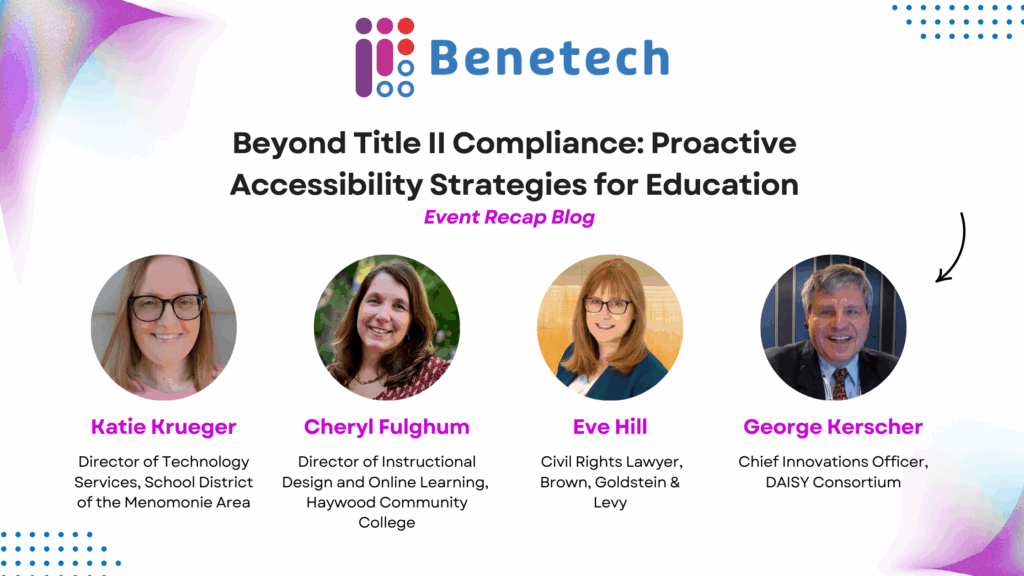Beyond Title II Compliance: Proactive Accessibility Strategies for Education

…
How Institutions Can Build a Culture of Access
On August 6, 2025, Benetech brought together leading voices in accessibility for a timely and candid webinar: “Beyond Title II Compliance: Proactive Accessibility Strategies.” Moderated by Michael Johnson, the conversation tackled the legal landscape, common pitfalls, and what it truly means to move from compliance to culture change in education.
The message was clear: accessibility isn’t just a legal requirement—it’s a moral imperative. And the time to act is now.
What does “Beyond Compliance” really mean?
Too often, accessibility is seen as a checkbox, something handled by special education teams or reactive legal teams. But our panelists urged institutions to take a different view:
“Going beyond compliance is about building a culture where every student, regardless of ability, feels included, supported, and empowered to succeed.”
—Katie Krueger, Technology Director, School District of the Menomonie Area
“This isn’t just about students—it’s about your entire community: parents, alumni, event attendees, and the public. Title II covers them too.”
—Eve Hill, Disability Rights Attorney
“Accessibility helps everyone. The tools we build for students with disabilities often benefit English language learners and all students.”
—George Kerscher, DAISY Consortium
The legal landscape: Title II, vendors, and no more excuses
With new ADA Title II regulations taking effect in April 2026, many institutions are wondering how this impacts them.
The truth? You’re already obligated under Title II.
Eve Hill made it crystal clear:
“Size and funding are not exemptions. If you’re covered by Title II, you’re on the hook.”
And while some schools may rely on VPATs (Voluntary Product Accessibility Templates) to assess third-party tools, Eve reminded the audience that VPATs are just the beginning—not a shield from responsibility.
“If your digital tools or platforms are inaccessible, you—not the vendor—are legally responsible. That’s why vendor vetting and contract language matter.”
— Eve Hill
A K–12 accessibility journey: Starting small, thinking Big
In Menomonie, Wisconsin, Katie Krueger and her district took small, meaningful steps to improve digital accessibility and eventually partnered with Benetech to expand their work.
Their efforts included:
- A full website accessibility audit
- Internal policy reviews and team conversations
- The Benetech BASE program, which provided:
- A maturity model to assess school-wide accessibility readiness
- A detailed inventory of third-party tools
- Actionable next steps prioritized by impact
“We didn’t realize how far we’d come until we saw the audit results. That gave us hope—and a path forward.”
— Katie Krueger
The School District of the Menomonie Area also plans to partner with Benetech on upcoming Professional Development sessions to help staff reinforce accessibility best practices in the hopes of creating lasting change in their organization.
Preparing for the future: Advice from the experts
Whether you’re in K–12 or Higher Ed, the message was clear: adoption cycles and procurement decisions are critical moments for accessibility.
George Kerscher emphasized:
- Require third-party certification, not just vendor promises.
- Adopt tools in accessible formats like EPUB instead of inaccessible PDFs.
- Make sure the reading systems themselves (not just the content) work with assistive technologies.
“If you’re choosing tools today that aren’t accessible, you’re putting your institution at risk tomorrow.”
— George Kerscher
So where should you start?
At the end of the session, panelists offered one powerful piece of advice each:
George Kerscher:
“Make accessibility part of your next adoption cycle—and put it in your contracts.”
Katie Krueger:
“Build a team. Assign clear roles. Make accessibility a shared responsibility.”
Eve Hill:
“Stop digging. Stop posting inaccessible content. Train your people and set clear expectations today.”
Take the first step
At Benetech, we believe that access is joy—and access is justice. Whether you’re a school district just beginning this journey or a higher ed institution refining your approach, we’re here to help.
Explore our services, tools, and resources designed to meet institutions where they are and help them grow.
Learn more at benetech.org/what-we-do
Questions? Reach out to [email protected]
Missed the webinar event? Check out the live recording.
Let’s move beyond compliance—and build a future where every learner is part of the story.